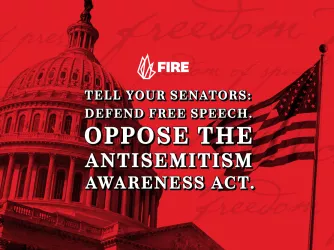Table of Contents
Not a Threat, an Opportunity
When FIRE learned that SFSU was pushing forward with disciplinary proceedings against the College Republicans, we wrote an urgent letter to SFSU President Robert Corrigan advising him of the serious legal risks involved in pursuing a course of action that is clearly proscribed by established, well-known Supreme Court precedent. FIRE wrote that:
Any punishment enforced against the College Republicans under SFSU’s student conduct policies as a consequence of their exercise of their First Amendment rights is an unlawful deprivation of constitutional rights under 42 U.S.C.S. § 1983 for which SFSU administrators can be sued in their individual capacities. Moreover, when the law is as clearly established as it is in this case—the Supreme Court’s well-known and unequivocal holding in Texas v. Johnson, 491 U.S. 397 (1989) that flag desecration is constitutionally protected—any claims of immunity on the part of the individual administrators will likely fail. State officials and employees are offered only qualified immunity “insofar as their conduct does not violate clearly established statutory or constitutional rights of which a reasonable person would have known.” Davis v. Scherer, 468 U.S. 183 (1984).
Existing First Amendment law leaves no doubt that the College Republicans’ expressive activity enjoys complete protection under the First Amendment. No reasonable person could claim otherwise. As such, your persistence in pursuing potential disciplinary sanctions against the College Republicans effectively waives immunity from liability under § 1983. To be clear, if you continue to ignore your constitutional obligations, you risk personal liability for depriving your students of their rights.
In sending the letter, FIRE was giving President Corrigan and the other administrators involved an opportunity to call off the dogs before committing yet another serious violation of the College Republicans’ constitutional rights. Instead of seeing the letter as an opportunity, however, President Corrigan viewed it as a threat. In his response to that letter, which FIRE received yesterday, President Corrigan wrote:
I object strongly to the letter’s hostile tone and threatening statements about possible legal action against individuals participating in the SOHP process—threats that I and others read as an attempt to intimidate members of the university community into substituting FIRE’s judgment for their own.
FIRE merely informed Corrigan and the other administrators involved of the state of the law. If they find that intimidating, well, maybe that’s because they know that their conduct is legally indefensible.
Recent Articles
FIRE’s award-winning Newsdesk covers the free speech news you need to stay informed.

Iranian agents accused of attempted assassination on U.S. soil — again

FIRE statement on congressional leaders smuggling unconstitutional Antisemitism Awareness Act into a must-pass defense bill

149 days and counting! Will the White House grant a posthumous pardon in the D.M. Bennett Case? — First Amendment News 447
